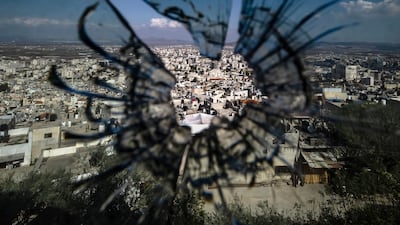Live updates: Follow the latest news on Israel-Gaza
The European Union on Tuesday said it would continue sending aid to Palestinians after a review found no misuse of funds.
Announced on October 9, the EU audit into aid for Palestine included the screening of beneficiaries to check that funds were not being diverted to terrorist groups such as Hamas and that no recipients of aid had incited hatred or violence.
"The review found no indications of EU money having directly or indirectly benefited the terrorist organisation Hamas," executive vice president of the EU Commission Valdis Dombrovskis said on Tuesday.
"The review found that the control systems in place have worked.
"As a result, payments to Palestinian beneficiaries and [the UN agency for Palestinian Refugees] UNRWA will continue without delays."
EU Commission officials have said the review was necessary due to the unprecedented situation caused by the Hamas attacks on Israel that killed around 1,200 people, down from an initial estimate of 1,400. Israel has retaliated with intense bombing of the Gaza Strip, as well as a ground offensive, in which more than 13,000 have been killed, the enclave's authorities say.
"In this extremely polarised environment, there is a duty of care and a necessity to respect precautionary principles," an EU official said.
The bloc's review is seen widely as a face-saving exercise after announced a suspension of all aid to Palestinians that was immediately contradicted by senior EU officials including the bloc’s foreign policy chief Josep Borrell.
The probe was launched in unusual circumstances. It came after European Commissioner Oliver Varhelyi, from Hungary, announced all development funds would be "immediately suspended" after the Hamas attack.
"All projects put under review. All new budget proposals … postponed until further notice," he said.
Only hours later, the commission backtracked, saying in a terse statement there would be “no suspension of payments”. As the investigation showed, no payments to the Palestinians were even due.
Tuesday's announcement came as rumours of an imminent truce in the Gaza Strip intensified. EU countries are deeply divided between those who strongly support Israel and others who have voiced more concern for the lives of Palestinian civilians.
Speaking in Brussels, German's Economic Co-operation and Development Secretary Jochen Flasbarth said it was crucial "not forget who the aggressor was, and Israel has the right to defend itself".
"Of course, international law has to be respected," he added.
Belgium's Minister for Development Co-operation Caroline Gennez said more humanitarian aid was urgently needed in Gaza.
She voiced support for the UN's repeated calls for a ceasefire – a plea which has not been met with unanimous support among the bloc's 27 countries.

"Denying people food, water and medical supplies is a violation of international humanitarian law," said Ms Gennez.
"Bombing schools, hospitals, innocent civilians and aid workers is a violation of international humanitarian law. It is time to end the cycle of violence now.
"I would strongly urge Israel to open up humanitarian access from Erez and Kerem Shalom" said Ms Gennez, highlighting that only one border crossing, Rafah, is open through which aid can arrive in Gaza.
The EU has a no-contact policy with Hamas, which it has listed as a terror organisation, since 2007.
No breaches of contractual obligations were found by the Commission, which double-checked 119 contracts worth €331 million ($362.3 million), of which 65 per cent were cleared.
Infrastructure and energy projects worth €75.6 million in the Gaza Strip were deemed unfeasible in the current war context, of which €25 million has already been reallocated to programmes supporting Palestinians.
However, two unnamed projects, worth €8 million, involving Palestinian civil society organisations were suspended due to concerns over hate speech and the glorification of terrorism, officials said.
EU officials who conducted the review recommended to all 27 EU commissioners, collectively known as the Commission's college, apply stricter controls in monitoring hate speech and the promotion of anti-Semitism among Palestinian NGOs that receive aid.
Mr Dombrovskis did not mention whether the college adopted that proposal.
EU officials said the extra checks, which were suggested for all NGOs in Palestine and Israel, could include an anti-incitement clause. They described the potential checks as "proportionate" and not unprecedented. Such controls are already place for other aid programmes such as those aimed at Syrian refugees, they said.
The EU will continue supporting the Palestinian Authority, including with a programme that pays salaries and pensions in the occupied West Bank to 90,000 beneficiaries.
Since 2017, the Gaza Strip has been excluded from this programme but poor and vulnerable families in the enclave still receive cash transfers, the EU official said.
Checks are already in place that beneficiaries are not on any sanctions list, with an error rate of 0.03 per cent, sources said.
The EU is waiting for more information from civil society organisations in the case of 51 contracts worth €39 million but has no reason to believe that contractual obligations were breached.




































